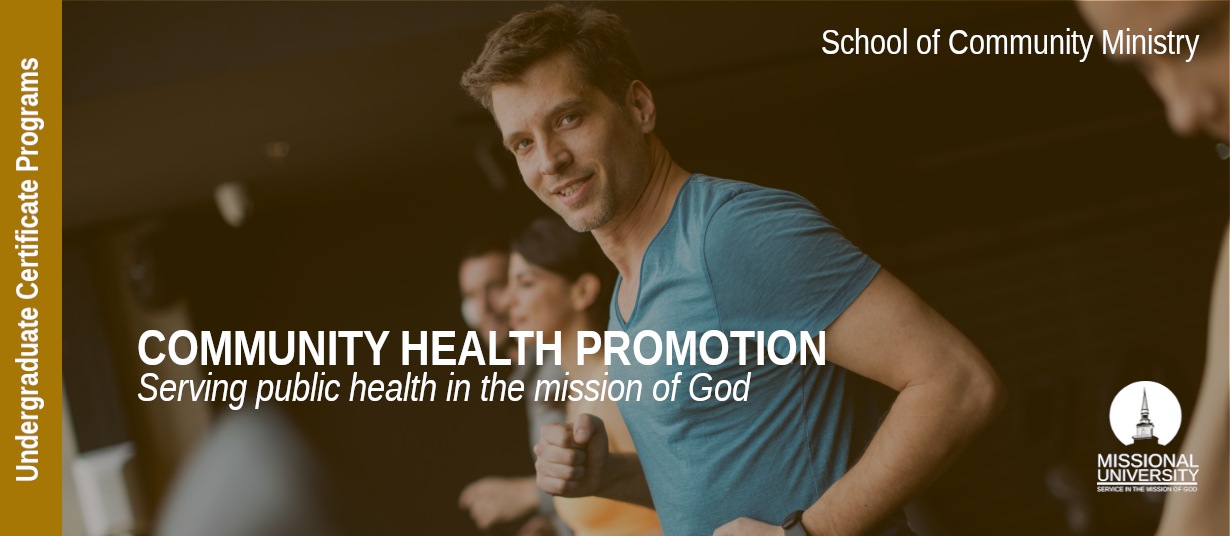
Online Undergraduate Certificate in
Community Health Promotion
⚜ Rarely Offered in Christian Universities, Bible Colleges or Seminaries
Expand Your Missional Service Today!
REQUEST INFORMATION
Ready to learn more about the
Undergraduate Certificate in
Community Health Promotion?
LEARN MORE NOW
Designed for students with a background in health care, public health, or community ministry, the Undergraduate Certificate in Community Health Promotion equips students to design and deliver health and wellness services for various settings. Students learn how to promote healthy lifestyles, prevent health problems, promote the role of well-being, provide health coaching and patient education programs, and lead efforts to create healthy environments and policies.
Health promotion improves the health status of individuals, families, communities, states, and nations. Health promotion enhances quality of life, prevents disease, and reduces premature deaths. By focusing on prevention, health promotion reduces costs to individuals, families, employers, insurance companies, medical facilities and employers. Missional graduates learn how to serve the church and community through research, health education, developing action campaigns, advocating for change, networking with organizations and systems to increase community involvement, creating community health development plans, and building partnerships to eliminate duplication and maximize resources.
Program Features
-
Integrated practicums allow you to gain valuable real-world experience
-
Learn from academic practitioners from around the world
-
Credits earned in this certificate program can apply to a Missional University Bachelor degree program
Course Effort
Course Length
Credits Required
Program Cost
What Will I Study?
We offer the most comprehensive approach to community health promotion in the mission of God.
Addresses the worldwide experience of suffering through a biblically-informed perspective for the sake of the Church’s mission to a hurting world. Topics addressed in this course will include pastoral care, nursing, healthcare, and healing (both spiritual and physical) as they pertain to disease and disability. Students will be assessed on the readings and lectures through online discussion, case-studies, and service projects.
Promotion of healthly lifestyles is essential to ensuring the medical care of communities. The course will consider how to conduct advocacy research, provide education and encouragement, conduct action campaigns and how to use the church to effect change. This will be explored by considering local cultural and societal influences and determining how best to conduct outreach.
Participants will learn to research factual information, gain skill in writing persuasively, hone critical thinking skills (if this, then that), provide oral and written presentations, using a variety of formats and for multiple and various constituencies. Students must have either microsoft office or libre office programs, be fluent in chart, graph, table, as well as text and presentation formats.
What is capacity building? The course will look at how health improvement can be accomplished by working across communities, organisations and systems to increase involvement, decision making and ownership at a local level.
Key concepts and applications introduced, discussed and mastered include needs assessment, community relationships (participatory continuum), funding opportunities, writing a plan including goals and desired outcomes, sustainability, implementation and evaluation tools and models, marketing strategies, and assessment of outcomes. Participants will develop and walk through each process in community through selection of an organization/organizations to work with, seeking appropriate input, and conducting a needs assessment. Participant program plan sections and completed plan will be critiqued by peers and graded by instructor.
In a time of greater need of resources, shrinking pool of resources, and a greater need for accountability to serve the health of community, building partnerships is necessary to eliminate duplication, ensure that the same goals are being espoused by multiple healthcare agencies and services. The health of a community will only improve with key resources working together and buy in by constituencies.
Optional Additional Courses:
What does research indicate about the relationship between spirituality and personal wellness? This course will explore the nature of spiritual assessments and the interrelatedness of the spiritual to the biological, social, and psychological aspects of people.
This course will explore the many facets of faith and health looking for intersections and how both faith and concepts of health impact individuals and congregations. The participant will explore in depth personal perspectives of faith and health.
Millions of people still experience hunger and poor health from malnutrition despite global resources. Students will learn about the opportunities and barriers to sustainable nutrition within communities from a biblical perspective. Case-studies and readings emphasize nutritional needs for health promotion and disease prevention across the lifespan.
This course provides the participant with a greater understanding of holistic care as an aspect of community healthcare emphasizing how spiritual care is intimately entwined with physical, mental, social, and environmental caregiving for individuals, families, congregations, and communities.
When Can I Get Started?
We offer multiple start dates each year to give you flexibility in your education, life and work schedules.
JANUARY
MARCH
MAY
AUGUST
OCTOBER
A Career in Transforming Communities
Is this Your Mission?
Health Education Assistant, Health Educator, Health Education Outreach Coordinator, Health Fitness Specialist, Health & Wellness Coordinator, Health Outreach Specialist, Community Education Specialist, Community Health Worker, Community Health Education Coordinator, Community Health Educator, Exercise & Wellness Program Coordinator, Fitness and Wellness Specialist, Patient Navigator, Health Disparities Coordinator, Onsite Health Educator, Online Health Educator, Health Coach, Wellness Coach, Wellness Specialist, Community Relationship Manager, Director of Health and Fitness, Family & Health Services Supervisor, Fitness Center Manager, Fitness Program Manager, Health Promotion Program Manager, Wellness Director
Request Information Now
How Much Will it Cost?
We offer tuition based upon country of residence. According to the Human Development Index, all countries around the world fall into one of four categories:
-
(Tier 1) - Very High Human Development
-
(Tier 2) High Human Development
-
(Tier 3) Medium Human Development
-
(Tier 4) Low Human Development
Our tiered global tuition makes higher education affordable for everyone world wide.

TIER COUNTRIES
100% Tuition
$295
per credit hour
3 credit course
$885

TIER COUNTRIES
80% Tuition
$236
per credit hour
3 credit course
$708

TIER COUNTRIES
60% Tuition
$177
per credit hour
3 credit course
$531

TIER COUNTRIES
40% Tuition
$118
per credit hour
3 credit course
$354
Tiered tuition based on country of origin and scholarships available. Find your country of residence here for more information.
Tuition may be further reduced by participating in the Sponsorship Program.
